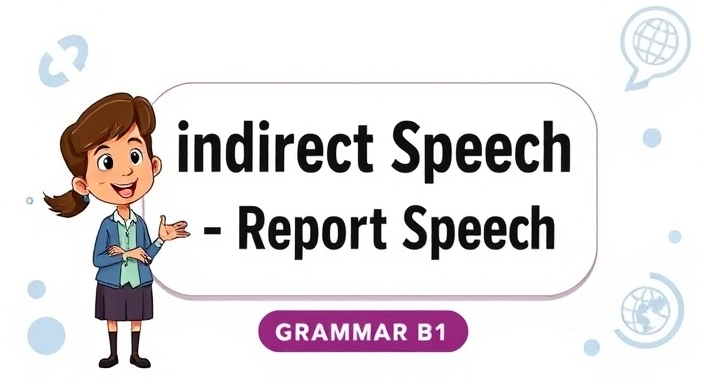Indirect speech – reported speech
- Home ›
- Grammar ›
- B1 Intermediate ›
- Indirect speech – reporte...




Choose the correct form to complete the sentences below.
Choose the correct form for each gap below.
Turn these sentences into indirect speech.

- 07 December, 2024
- 573
- Grammar
- B1 Intermediate
Indirect speech – reported speech
Indirect speech, also known as reported speech, is used to tell someone what another person said, thought, or felt. Unlike direct speech, where the exact words are quoted, indirect speech requires changes to pronouns, verb tenses, and time expressions to reflect the shift in perspective.
Key Features of Indirect Speech
- Tense Changes: Verbs often shift back in time (e.g., present → past, past → past perfect).
- Pronoun Adjustments: Pronouns are modified to align with the new subject or object.
- Time and Place Expressions: Words like today, now, and here are adapted accordingly.
Tense Changes
In indirect speech, the verb tense in the reported clause typically changes as follows:
| Direct Speech | Indirect Speech |
|---|---|
| Present Simple: "I work every day." | Past Simple: He said he worked every day. |
| Present Continuous: "I am studying now." | Past Continuous: She said she was studying then. |
| Past Simple: "We visited Paris." | Past Perfect: They said they had visited Paris. |
| Future: "I will call you." | Conditional: He said he would call me. |
Pronoun Changes
Pronouns in indirect speech are adjusted based on who is reporting and who was originally speaking:
- Direct: "I need your help." → Indirect: She said she needed my help.
- Direct: "This is my book." → Indirect: He said that was his book.
Time and Place Expressions
Time and place expressions in direct speech also change in indirect speech:
- Direct: "I will do it today." → Indirect: She said she would do it that day.
- Direct: "We are meeting here." → Indirect: They said they were meeting there.
Common Mistakes
Here are some typical errors to avoid:
- They said me they were leaving.
- They told me they were leaving.
- She told that she was busy.
- She said that she was busy.
Questions in Indirect Speech
When reporting questions, the word order changes to follow standard subject-verb structure without question auxiliaries like do or did.
- Direct: "Where do you live?" → Indirect: He asked where I lived.
- Direct: "Did she call you?" → Indirect: He asked if she had called me.
Imperatives in Indirect Speech
To report orders or requests, use verbs like ask or tell followed by to + base verb:
- Direct: "Close the door." → Indirect: He told me to close the door.
- Direct: "Please help me." → Indirect: She asked me to help her.
Unfortunately, we currently do not have teaching materials available on this topic. We are working with all our efforts to prepare it. You can subscribe to Verbooze to be notified once the teaching materials are ready.




English Learning Made Easy & Accessible for Everyone
Boost your English skills with interactive lessons, grammar explanations, reading and listening exercises, and real-time feedback. Join our growing community and start improving today — all completely free!

